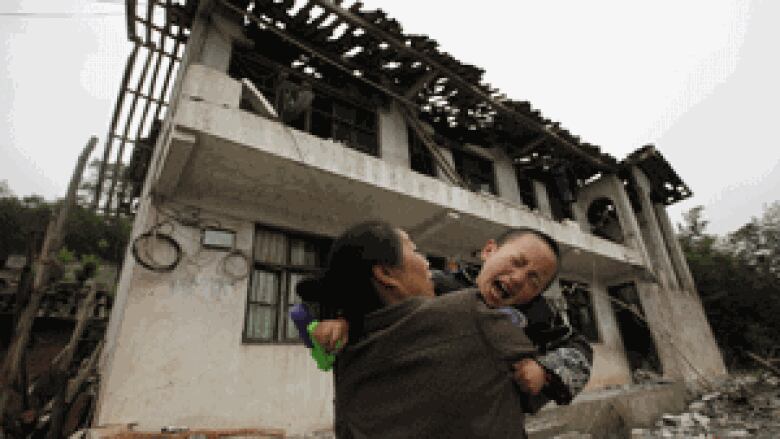China rescuers rush into remote areas after quake kills 186
More than 11,000 injured in Sichuan province
Rescuers in Chinapushedinto remote villages in Sichuan province,hit by an earthquake that has killed 186and injured more than 11,000 as survivors make do living incars ormakeshift tents.
Dozens remain missing, mostly in the rural communities around Ya'an city, along the same fault line where a devastating quake to the north killed more than 90,000 people in Sichuan and neighbouring areas five years ago in one of China's worst natural disasters.
The Lushan and Baoxing counties hardest-hit on Saturday had escaped the worst of the damage in the 2008 quake, and residents there said they benefited little from the region's rebuilding after the disaster, with no special reinforcements made or new evacuation procedures introduced in their remote communities.
Relief teams flew in helicopters and dynamited through landslides Sunday to reach some of the most isolated communities, where rescuers in orange overalls led sniffer dogs through piles of brick, concrete and wood debris to search for survivors.
Many residents complained that although emergency teams were quick to carry away bodies and search for survivors, they had so far done little to distribute aid. "No water, no shelter," read a hand-written sign held up by children on a roadside in Longmen.

"I was working in the field when I heard the explosions of the earthquake, and I turned around and saw my house simply flatten in front of me," said Fu Qiuyue, a 70-year-old rapeseed farmer in Longmen.
Fu sat with her husband, Ren Dehua, in a makeshift shelter of logs and a plastic sheet on a patch of grass near where a helicopter had parked to reach their community of terraced grain and vegetable fields. She said the collapse of the house had crushed eight pigs to death. "It was the scariest sound I have ever heard," she said.
Aftershocks continue
The quake -- measured by China's earthquake administration at magnitude 7.0 and by the U.S. Geological Survey at 6.6 -- struck shortly after 8 a.m. on Saturday. Tens of thousands of people moved into tents or cars, unable to return home or too afraid to go back as aftershocks continued to jolt the region.
Canada offers aid
Here is the message sent to China from Foreign Affairs Minister John Baird and International Co-operation Minister Julian Fantino:
On behalf of all Canadians, we extend our deepest sympathies to those affected by the devastating earthquake in Sichuan, China. Our thoughts and prayers go out to the people of China, especially those who have lost family members or friends. We also wish those injured in this disaster a speedy recovery. Canada stands ready to assist China if requested.
The Embassy of Canada in Beijing and the Consulate General in Chongqing are working with Chinese authorities to determine whether any Canadians have been injured in the earthquake. To date, we have not received any reports that Canadians have been affected, although officials in Ottawa, Beijing and Chongqing stand ready to provide consular assistance.
Canadian citizens in the region requiring emergency consular assistance should call the Consulate General of Canada in Chongqing at +86 23 6373 8007 or Foreign Affairs and International Trade Canada's Emergency Operations Centre collect at +1 613 996 8885, or send an email to sos@international.gc.ca.
The quake killed at least 186 people, left 21 missing and injured 11,393, the official Xinhua News Agency quoted the provincial emergency command centre as saying.
As in most natural disasters, the government mobilized thousands of soldiers and others, sending excavators and other heavy machinery as well as tents, blankets and other emergency supplies. Two soldiers died after their vehicle slid off a road and rolled down a cliff, state media reported.
The Chinese Red Cross said it had deployed relief teams with supplies of food, water, medicine and rescue equipment to the disaster areas.
Lushan, where the quake struck, lies where the fertile Sichuan plain meets foothills that eventually rise to the Tibetan plateau and sits atop the Longmenshan fault, where the 2008 quake struck.
The seat of Lushan county has been turned into a large refugee camp, with tents set up on open spaces, and volunteers doling out noodles and boxed meals to survivors from stalls and the backs of vans.
A large van with a convertible side served as a mobile bank with an ATM, military medical trucks provided X-rays for people with minor injuries, and military doctors administered basic first aid, applying iodine solution to cuts and examining bruises.
Patients with minor ailments were lying in tents in the yard of the local hospital, which was wrecked by the quake, with the most severely injured patients sent to the provincial capital. With a limited water supply and buildings inaccessible, sanitation is a problem for the survivors.












_(720p).jpg)


 OFFICIAL HD MUSIC VIDEO.jpg)
.jpg)



























































































